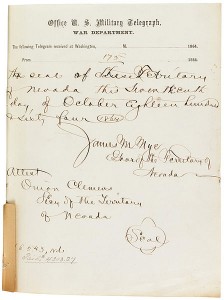As skywatchers prepared for the return of Halley’s comet in 1910, they heard some alarming scientific predictions: Poisonous gases in the comet’s tail might “snuff out all life on the planet,” “leaving the burnt and drenched Earth no other atmosphere than the nitrogen now present in the air.” How should a responsible citizen evaluate a dire prediction by a minority of experts? In this week’s episode of the Futility Closet podcast, we explore the Halley’s hysteria, remember the alarming predictions made for Y2K, and recall a forgotten novella in which Arthur Conan Doyle imagined a dead Earth fumigated by cosmic ether.
We also consider the odd legacy of an Australian prime minister who disappeared in 1967, investigate the role of balloon-borne sheepdogs during the Siege of Paris, learn why Mark Twain’s brother telegraphed the entire Nevada constitution to Washington D.C. in 1864, and offer a chance to win a book in the next Futility Closet Challenge.
Our main feature this week concerns the hysteria that greeted the return of Halley’s comet in 1910, based on ill-founded fears that compounds in the comet’s tail would poison the atmosphere.
This seems to have inspired to Arthur Conan Doyle to write The Poison Belt, a 1913 novella in which “our planet has swum into the poison belt of ether, and is now flying deeper into it at the rate of some millions of miles a minute.” (Thanks to Jason Holt for this tip.)
We mentioned also that Australian prime minister Harold Holt disappeared while in office in 1967 — he’d gone swimming near Portsea in an area known for its strong rip tides and was never seen again.
The Harold Holt Memorial Swimming Centre, in Melbourne, was under construction at the time and was named in his memory — a swimming pool named for a man who probably drowned:

On March 17 we’d noted that the Nevada Territory had sent its entire constitution to Washington D.C. by telegraph in 1864, in order to join the Union before Election Day. The last leaf of the 175-page transcription, below, shows the word count and cost; Jim Russell, Michael Kindell, and Bruce Barnfield all wrote in to note that it also bears the signature of Orion Clemens, who was secretary of the territory — and Mark Twain’s brother.
Here are three references that mention that balloon-borne sheepdogs were used to carry dispatches during the Siege of Paris:
- Robert Lowry Sibbet’s The Siege of Paris (1892) notes that “the Général Faidherbe sailed on the 13th inst. [1870] and landed a few miles from Bordeaux. M. Hurel took out five bulldogs which, he believes, will return to Paris with dispatches in their collars. The owners of the dogs are to receive two hundred francs for every dispatch they bring back.”
- Alistair Horne’s The Fall of Paris: The Siege and the Commune 1870-71 (2007) notes that altogether some 65 manned balloons left Paris during the siege, carrying “164 passengers, 381 pigeons, 5 dogs, and nearly 11 tons of official dispatches.”
- Michael Howard’s The Franco-Prussian War, published last year, confirms that five dogs were sent, but gives no further details.
I’ve just acquired John Fisher’s 1965 book Airlift 1870, a thorough account of the balloon and pigeon post during the siege, which seems to confirm the dog story — I’ll discuss that in an upcoming episode.
This week’s Futility Closet Challenge is inspired by Douglas Adams and John Lloyd’s 1983 book The Meaning of Liff, which they describe as a “dictionary of things that there aren’t any words for yet.” Take any place name and invent a useful new definition for it. Examples from their book:
- clun: “A leg which has gone to sleep and has to be hauled around after you.”
- hoggeston: “The action of overshaking a pair of dice in a cup in the mistaken belief that this will affect the eventual outcome in your favour and not irritate everyone else.”
- moffat: “That part of your coat which is designed to be sat on by the person next to you on the bus.”
We propose that sheboygan should mean “to recognize an actor in a movie but not be able to place him.” A secondary definition is “to mistake the downbeat of a song during an instrumental introduction, leaving you helpless to reorient yourself until the melody starts” (I’m always confused by “All Along the Watchtower”).
Post your own entry below or mail it to podcast@futilitycloset.com by Friday, March 28. Our favorite entry will win a copy of our book, Futility Closet: An Idler’s Miscellany of Compendious Amusements.
Thanks again to Doug Ross for the music in this episode.
You can listen using the player above, download this episode directly, or subscribe on iTunes or via the RSS feed at http://feedpress.me/futilitycloset. The show notes are on the blog, where you can also enter your submissions in this week’s Challenge. Many thanks to Doug Ross for the music in this episode.
Next week we plan to discuss the sad, enigmatic tale of Lillian Alling, an immigrant who grew disenchanted with New York and decided to walk home to Siberia; explore the curious significance of October 4 to Samuel Taylor Coleridge; and offer a new Futility Closet Challenge. If you have any questions or comments you can reach us at podcast@futilitycloset.com. Thanks for listening!

